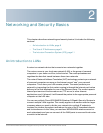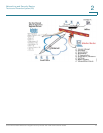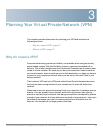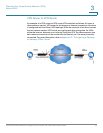
1
Cisco WRVS4400N Wireless-N Gigabit Security Router with VPN Administration Guide 6
Introduction
Thank you for choosing the Cisco WRVS4400N Wireless-N Gigabit Security
Router with VPN. The Wireless-N Gigabit Security Router with VPN is an advanced
Internet-sharing network solution for your small business needs. WRVS4400N lets
multiple computers in your office share an Internet connection through both wired
and wireless connections.
The WRVS4400N wireless router features a built-in 4-Port full-duplex 10/100/
1000 Ethernet switch, which allows you to connect four personal computers
directly, or you can connect more hubs and switches to create as big a network as
you need.
You can use the WRVS4400N wireless router as an intranet router to aggregate
traffic to a company backbone network.
The WRVS4400N wireless router has a built-in access point that supports the
latest 802.11n draft specification by IEEE. The WRVS4400N wireless router also
supports 802.11g and 802.11b clients in a mixed environment.
The built-in access point can support an 11n data rate of up to 300 Mbps. In
addition to having a higher data rate, 802.11n technology also promises longer
coverage by using multiple antennas to transmit and receive data streams in
different directions.
The Cisco WRVS4400N Wireless-N Gigabit Security Router with VPN is equipped
with advanced security technologies like Intrusion Prevention System (IPS),
Stateful Packet Inspection (SPI) Firewall, IP based Access List (IP ACL), and
Network Address Port Translation (NAPT, also called NAT as a more generic term).
These technologies work together by providing self-defensive strategy. They
identify, classify, and stop malicious attack traffic in real time while passing
through the WRVS4400N wireless router.
The SPI Firewall provides deep packet inspection to analyze packets in network
layer (IP) and transport layer (TCP, UDP) to block illegal packet transactions. You
can also use IP based ACL to limit traffic to a specific source, destination and
protocol.


















